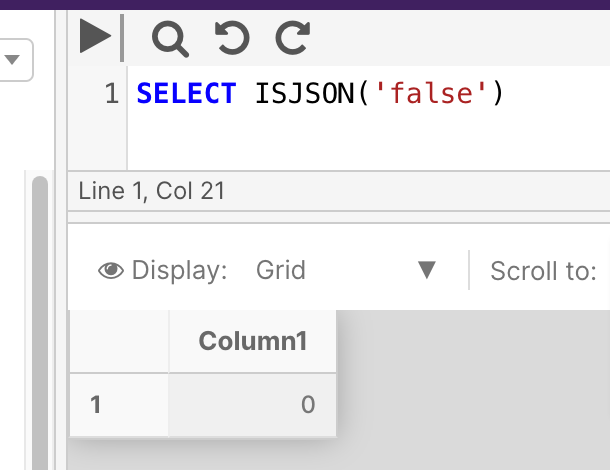JSON functions
Overview
This page details the available JSON functions in Cinchy. The JSON functions covered in this section are:
These functions aren't currently available in PostGres deployments.
ISJSON
This function tests whether a string contains valid JSON.
Syntax
ISJSON ( expression )
Arguments
| Argument | Description | Example |
|---|---|---|
expression | The string to test | false |
Return Type
| Return Value | Description |
|---|---|
| 1 | Returned if the input is a valid JSON object or array. |
| 0 | Returned if the input isn't a valid JSON object of array. |
| Null | Returned if the expression is null. |
Example 1
The below example tests whether the expression true is valid JSON.
SELECT ISJSON('true')

Example 2
The below example will return all rows from the [Expression] column in the [Product].[Function Table] that contain valid JSON.
SELECT [Expression]
FROM [Product].[Function Table]
WHERE ISJSON = 1
JSON_VALUE
JSON_VALUE extracts a scalar value from a JSON string.
Syntax
JSON_VALUE ( expression , path )
Return Type
Returns a single text value of type nvarchar(4000). The collation of the returned value is the same as the collation of the input expression.
Arguments
| Argument | Description | Example |
|---|---|---|
expression | An expression, typically a variable or column with JSON text. | @payload |
path | A JSON path specifying the property to extract. Returns an error if the format of path isn't valid. | '$.properties.city.value' |
Example
The below example extracts the value of the JSON property into a local variable.
SET @city = JSON_VALUE(@payload, '$.properties.city.value')
JSON_QUERY
JSON_QUERY extracts an object or an array from a JSON string.
Syntax
JSON_QUERY ( expression [ , path ] )
Return Type
Returns a JSON fragment of type nvarchar(max). The collation of the returned value is the same as the collation of the input expression.
Arguments
| Argument | Description |
|---|---|
| Expression | An expression, usually a variable or column with JSON text. Returns an error for invalid JSON before or after identifying the value by path in JSON_QUERY. |
| Path | A JSON path for property extraction. Default value is '$', making JSON_QUERY return the input expression if path is not specified. Follows zero-based indexing (e.g., employees[0] for first value). Returns an error for invalid path format. |
Example
DECLARE @data NVARCHAR(4000);
SET @data = N'{
"employees":
[ {
"name":"Kevin",
"email":"kevin@gmail.com",
"age":42
}
]
}';
SELECT JSON_QUERY(@data, '$.employees[0]') AS 'Result';
It would return the following result:
{
"name":"Kevin",
"email":"kevin@gmail.com",
"age":42
}
JSON_MODIFY
JSON_MODIFY updates the value of a property in a JSON string and returns the updated JSON string.
Syntax
JSON_MODIFY ( expression , path , newValue )
Return Type
Returns the updated value of expression as properly formatted JSON text.
Arguments
| Argument | Description |
|---|---|
| Expression | An expression, usually a variable or column with JSON text. JSON_MODIFY returns an error for invalid JSON in expression. |
| Path | A JSON path for extraction. Supports optional modifiers: append, lax, strict. append adds the new value to an array. lax tries to insert if property is missing. strict returns an error if property is missing. Invalid path format also triggers an error. |
| newValue | New value for property specified by path. Must be [n]varchar or text. |
Example 1
The following example sets the surname to Smith.
SET @info=JSON_MODIFY(@info,'$.surname','Smith')
It would return the following formatted JSON text:
{
"surname": "Smith"
}
OPENJSON
OPENJSON parses JSON text and returns objects and properties from the JSON input as rows and columns. In other words, OPENJSON provides a rowset view over a JSON document.
Syntax
OPENJSON( jsonExpression [ , path ] ) [ <with_clause> ]
Return Value
The return value of this function depends on the WITH clause. The full list of possible values can be found here.
Arguments
| Argument | Description | Example |
|---|---|---|
jsonExpression | A Unicode character expression containing JSON text. | |
Path | Optional. A JSON path referencing an object or array within the jsonExpression. OPENJSON seeks into the JSON text at the specified position and parses only the referenced fragment. | |
| with_clause | Optional. This clause explicitly defines the output schema for the OPENJSON function to return. You can review the elements of the clause here. |
Example 1
SELECT o.*
FROM OPENJSON((
SELECT j.Json
FROM [Cinchy].[Tables] j
WHERE
j.[Deleted] IS NULL
AND j.[Cinchy Id] = 1
)) o
Example 2
This example demonstrates how to extract the values from the JSON array in the following table:

-- Use the OPENJSON function to access each object in the array and JSON_VALUE (which extracts a scalar value from a JSON string) to retrieve the area code and number.
SELECT
t.[Name],
JSON_VALUE(o.value, '$.areaCode') AS [Area Code],
JSON_VALUE(o.value, '$.number') AS [Number],
FROM
[People].[Contacts] t
CROSS APPLY
OPENJSON((SELECT j.Phones
FROM [People].[Contacts] j
WHERE j.[Deleted] IS NULL AND j.[Name] = t.[Name])) o
WHERE
t.[Deleted] IS NULL